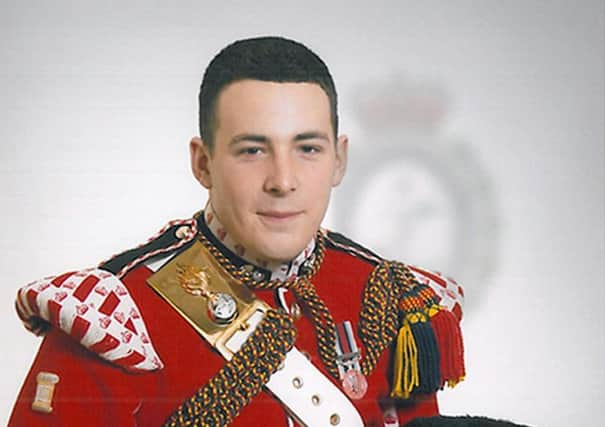Facebook in firing line over Lee Rigby murder


In a long-awaited 192-page report, the House of Commons intelligence and security committee (ISC) blamed the unnamed company for failing to take action against suspected extremists after it emerged killer Michael Adebowale had vowed to slay a soldier in an exchange six months before the attack.
It said such action could have helped to prevent the barbaric murder of Fusilier Rigby, who was killed near Woolwich barracks on 22 May last year. Although members of the ISC and Prime Minister David Cameron refused to publicly divulge the name of the internet site, it is understood to be the social network Facebook.
Advertisement
Hide AdAdvertisement
Hide AdThe group of MPs, chaired by Conservative Sir Malcolm Rifkind, said it was “highly unlikely” that the intelligence agencies would have seen the discussion, which came to light only after Fusilier Rigby’s murder, without the company’s help.
The committee also concluded that the three intelligence agencies – MI5, MI6 and GCHQ – could not have prevented the murder of Fusilier Rigby, despite a litany of errors and missed opportunities in seven previous operations featuring Adebowale and his older accomplice, Michael Adebolajo.
Facebook is named in the ISC report – but only as one of a number of communication service providers in the US from which UK agencies face “considerable difficulty” in accessing the content of communications. Apple, Google, Microsoft, Twitter and Yahoo are also named.
Last night, Mr Cameron said big internet companies had a “social responsibility” to act on terrorist material posted online.
But civil liberties groups raised concerns that the committee had “spun the facts” to shift blame on to internet firms and away from the intelligence agencies.
However, Fu- silier Rigby’s uncle, Raymond Dutton, who lives in Greater Manchester, said he did not believe his nephew’s brutal murder was preventable.
CONNECT WITH THE SCOTSMAN
• Subscribe to our daily newsletter (requires registration) and get the latest news, sport and business headlines delivered to your inbox every morning
He said: “I honestly don’t believe it could have been avoided. At the end of the day, the services are so stretched. It’s easy with hindsight to apportion blame and to look at it as a whole.
Advertisement
Hide AdAdvertisement
Hide Ad“I’m a firm believer Lee was in the wrong place at the wrong time. If it hadn’t been Lee, it would have been someone else. I honestly don’t believe it could have been averted, but perhaps the learning from the report is what we can do with the information we’ve gleaned from this sad murder of my nephew.”
The report found Adebowale had been in contact with an extremist now known to have links to al-Qaeda in the Arabian Peninsula in late 2012, but this was not revealed until an unidentified third party notified GCHQ after the attack. In the exchange, he expressed his desire to murder a soldier in retaliation for UK military action in Iraq and Afghanistan, although he had not developed a plan as to how he might carry out an attack.
It later emerged that a number of online accounts owned by Adebowale had been automatically disabled due to association with terrorists and terrorism – but the firm, believed to be Facebook, was unaware, as it does not manually review such decisions.
Announcing funding to improve the agencies’ capability to combat “self-starting” terrorists, Mr Cameron attacked internet firms for failing to help tackle the threat.
“Terrorists are using the internet to communicate and we must not accept that these communications are beyond the reach of the authorities or the internet companies,” he said.
“Their networks are being used to plot murder and mayhem. It is their social responsibility to act on this and we expect them to live up to that responsibility.”
Sir Malcolm said the US firm “could have made a difference” by flagging the online exchange.
“This was highly significant. Had MI5 had access to this exchange at the time, Adebowale would have become a top priority,” he said.
Advertisement
Hide AdAdvertisement
Hide Ad“There is, then, a significant possibility that MI5 would have been able to prevent the attack.
“However, this company does not regard themselves as under any obligation to ensure that they identify such threats, or to report them to the authorities. We find this unacceptable – however unintentionally, they are providing a safe haven for terrorists.”
Muslim converts Adebolajo and Adebowale ran down Fusilier Rigby near Woolwich Barracks, in south-east London, before savagely attacking the defenceless soldier as he lay in the road.
The ISC inspected hundreds of highly classified documents and questioned ministers, the heads of the three agencies and senior officers from the Metropolitan Police for its inquiry.
The fanatics appeared in seven different agency investigations, the ISC said, which contained “a number of errors”, including processes not being followed, decisions not being recorded or delays. But the MPs added: “We have concluded that, given what the agencies knew at the time, they were not in a position to prevent the murder of Fusilier Rigby.”
Isabella Sankey, director of policy for human rights group Liberty, said: “The ISC shamefully spins the facts, seeking to blame the communications companies for not doing the agencies’ work for them.”
Jim Killock, of the Open Rights Group, said: “To pass the blame to internet companies is to use Fusilier Rigby’s murder to make cheap political points.”
Last night, a Facebook spokesman said: “We don’t comment on individual cases, but Facebook’s policies are clear: we do not allow terrorist content on the site and take steps to prevent people from using our service for these purposes.”
SCOTSMAN TABLET AND IPHONE APPS